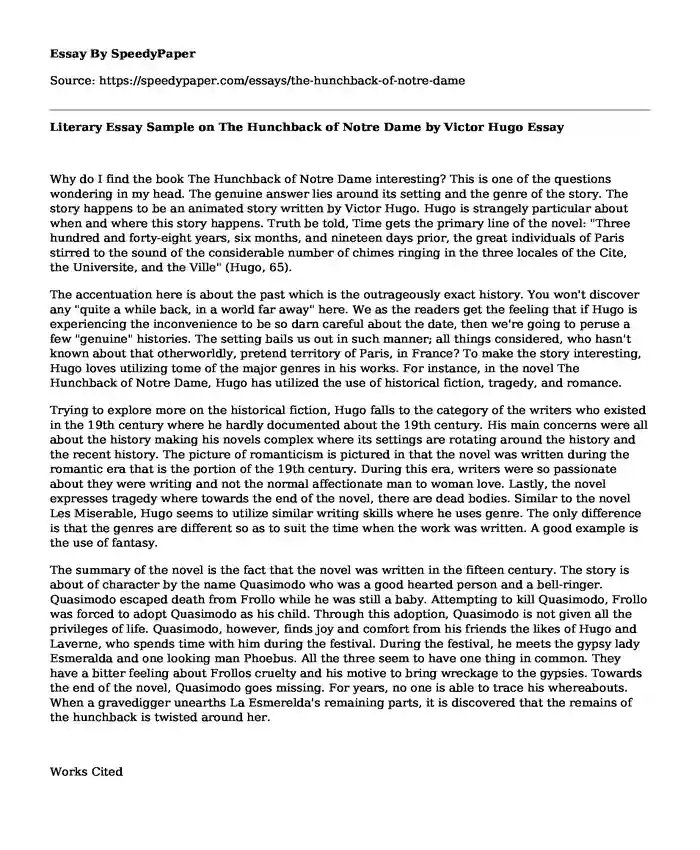
| Type of paper: | Essay |
| Categories: | Fiction Literature |
| Pages: | 3 |
| Wordcount: | 574 words |
Why do I find the book The Hunchback of Notre Dame interesting? This is one of the questions wondering in my head. The genuine answer lies around its setting and the genre of the story. The story happens to be an animated story written by Victor Hugo. Hugo is strangely particular about when and where this story happens. Truth be told, Time gets the primary line of the novel: "Three hundred and forty-eight years, six months, and nineteen days prior, the great individuals of Paris stirred to the sound of the considerable number of chimes ringing in the three locales of the Cite, the Universite, and the Ville" (Hugo, 65).
The accentuation here is about the past which is the outrageously exact history. You won't discover any "quite a while back, in a world far away" here. We as the readers get the feeling that if Hugo is experiencing the inconvenience to be so darn careful about the date, then we're going to peruse a few "genuine" histories. The setting bails us out in such manner; all things considered, who hasn't known about that otherworldly, pretend territory of Paris, in France? To make the story interesting, Hugo loves utilizing tome of the major genres in his works. For instance, in the novel The Hunchback of Notre Dame, Hugo has utilized the use of historical fiction, tragedy, and romance.
Trying to explore more on the historical fiction, Hugo falls to the category of the writers who existed in the 19th century where he hardly documented about the 19th century. His main concerns were all about the history making his novels complex where its settings are rotating around the history and the recent history. The picture of romanticism is pictured in that the novel was written during the romantic era that is the portion of the 19th century. During this era, writers were so passionate about they were writing and not the normal affectionate man to woman love. Lastly, the novel expresses tragedy where towards the end of the novel, there are dead bodies. Similar to the novel Les Miserable, Hugo seems to utilize similar writing skills where he uses genre. The only difference is that the genres are different so as to suit the time when the work was written. A good example is the use of fantasy.
The summary of the novel is the fact that the novel was written in the fifteen century. The story is about of character by the name Quasimodo who was a good hearted person and a bell-ringer. Quasimodo escaped death from Frollo while he was still a baby. Attempting to kill Quasimodo, Frollo was forced to adopt Quasimodo as his child. Through this adoption, Quasimodo is not given all the privileges of life. Quasimodo, however, finds joy and comfort from his friends the likes of Hugo and Laverne, who spends time with him during the festival. During the festival, he meets the gypsy lady Esmeralda and one looking man Phoebus. All the three seem to have one thing in common. They have a bitter feeling about Frollos cruelty and his motive to bring wreckage to the gypsies. Towards the end of the novel, Quasimodo goes missing. For years, no one is able to trace his whereabouts. When a gravedigger unearths La Esmerelda's remaining parts, it is discovered that the remains of the hunchback is twisted around her.
Works Cited
Hugo, Victor. The Hunchback of Notre-Dame. Ware: Wordsworth, 1993. Print.
Cite this page
Literary Essay Sample on The Hunchback of Notre Dame by Victor Hugo. (2019, Aug 29). Retrieved from https://speedypaper.net/essays/the-hunchback-of-notre-dame
Request Removal
If you are the original author of this essay and no longer wish to have it published on the SpeedyPaper website, please click below to request its removal:
- Essay Sample - Purchase Ledger Assistant Cover Letter
- Essay Example on Evaluation of Hellene's Proposed Venture
- Free Essay on General Social Anxiety Disorder and Social Anxiety Disorder
- Mrs. Dutta Writes a Letter - Free Essay in Literature
- Evolution and Background of the Book Publishing Industry. Paper Example
- Essay Sample on Supply and Demand in American Auto Industry
- Essay Sample on Employee Assistance Programs
Popular categories




